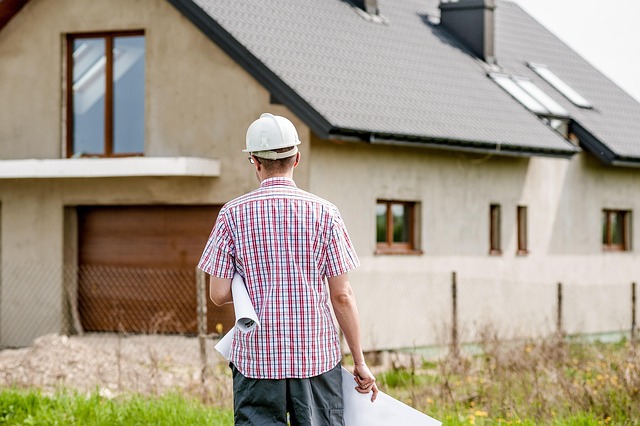Roofing contractors play a vital role in maintaining and enhancing both residential and commercial properties. They offer a comprehensive range of services using high-quality materials and advanced techniques, catering to diverse needs like green roofing and energy efficiency. Understanding the differences between residential and commercial roofing is key for property owners. Top-tier contractors provide expert installations, repairs, replacements, and inspections for various roofing types, prioritizing safety and reliability through licensing, insurance, and online reviews. Their use of innovative technologies and sustainable practices ensures longevity and cost savings. Prompt attention to roofing issues prevents further damage. Building strong relationships with reliable contractors is a strategic investment for long-term property protection and value.
Roofing contractors play a pivotal role in safeguarding our homes and businesses from the elements. Understanding their multifaceted responsibilities is key to making informed decisions when needing repairs or installations. This article delves into the world of roofing, exploring essential services, contract types (residential vs. commercial), and crucial considerations for choosing the right contractor. We also discuss modern technologies, common issues, and building lasting relationships with reliable roofing experts.
Understanding the Role of Roofing Contractors

Roofing contractors play a pivotal role in ensuring the structural integrity and aesthetic appeal of both residential and commercial buildings. They are responsible for installing, repairing, and replacing roofs, which serve as the first line of defense against harsh weather conditions. With their expertise, they provide solutions tailored to different roof types, from traditional shingles to metal and flat roofing systems.
These professionals offer a range of services, including roof inspections, leak repairs, and full-scale roof replacements. They work with high-quality materials and employ advanced techniques to guarantee durable and weatherproof roofs. Moreover, roofing contractors often specialize in specific areas, such as green roofing, energy-efficient solutions, or historic preservation, catering to diverse client needs and preferences.
Types of Roofing Contracts: Residential vs Commercial

When it comes to roofing projects, understanding the distinction between residential and commercial contracts is essential for both homeowners and business owners alike. Residential roofing typically involves single-family homes, townhouses, or apartments with relatively smaller structures. Roofing contractors specializing in this sector often focus on traditional styles and materials like asphalt shingles, metal roofing, or wood shakes, catering to diverse consumer preferences.
In contrast, commercial roofing deals with larger buildings such as office complexes, skyscrapers, warehouses, and retail spaces. These projects demand a different approach, requiring expertise in handling more complex designs, structural considerations, and often, the installation of flat or low-slope roofs. Commercial roofing contractors utilize specialized materials like TPO (Thermoplastic Olefin), EPDM (Ethylene Propylene Diene Monomer), or modified bitumen to ensure durability and withstand the unique challenges of higher structures.
Essential Services Offered by Roofing Professionals

Roofing professionals offer a range of essential services that cater to both residential and commercial needs. Among their key offerings are roof installations, repairs, and replacements, ensuring structures remain secure and weatherproof. These experts handle various roofing types, from traditional shingles to metal and flat roofs, providing tailored solutions to suit different architectural designs.
Additionally, they specialize in roof inspections, identifying potential issues like leaks, damaged shingles, or structural weaknesses early on. Regular maintenance checks are also a vital part of their services, helping to extend the lifespan of roofing systems and prevent costly repairs. Roofing contractors employ advanced techniques and high-quality materials to guarantee durable and aesthetically pleasing finishes.
Choosing the Right Contractor: Key Considerations

When choosing a roofing contractor, it’s crucial to consider several key factors to ensure a job well done and avoid potential headaches down the line. First, verify their licensing, insurance, and bond coverage to protect yourself from legal issues and financial risks. Reputable roofing contractors should be able to provide proof of these essentials without hesitation.
Additionally, check their reputation by reviewing online customer reviews and asking for references. Experience matters; opt for a contractor with a proven track record in both residential and commercial roofing projects, showcasing versatility and expertise. Their portfolio can offer valuable insights into the quality of their work and the variety of services they provide.
Expertise and Specializations in Roofing

When choosing roofing contractors, understanding their expertise and specializations is key. Top-tier contractors offer a wide range of services, from residential to commercial roofs, ensuring they can cater to diverse needs. They are well-versed in various roofing types, including asphalt shingles, metal, flat roofs, and eco-friendly options. Some even specialize in complex roof repairs, replacements, or custom designs.
Each project has unique requirements, so expertise matters. Roofing contractors with a proven track record in handling specific types of roofs demonstrate their adaptability and mastery. They stay updated on industry trends, ensuring they provide the best solutions. Whether it’s a simple repair or a large-scale commercial roofing project, having specialists who can offer tailored advice and execute with precision is invaluable.
The Importance of Quality Assurance and Safety Measures

When hiring roofing contractors, quality assurance and safety should be top priorities for homeowners and business owners alike. A roof is a significant investment, both in terms of cost and structural integrity. High-quality roofing materials and expert installation are crucial to ensure longevity and protect against severe weather conditions. Roofing contractors who prioritize safety measures also contribute to minimizing risks on the job site, protecting both workers and the surrounding environment.
Implementing rigorous quality control processes and adhering to safety regulations can make a significant difference in the outcome of any roofing project. It ensures that every phase, from initial assessment to final inspection, is carried out with precision and care. For businesses and residents, this translates into peace of mind, knowing their investment is in capable hands and that their property is secure.
Modern Roofing Technologies and Innovations

In today’s digital era, roofing contractors are not just laying shingles; they’re integrating modern technologies to enhance durability, efficiency, and aesthetics. Innovations like smart roofing materials, which incorporate sensors to monitor weather conditions, temperature, and even structural integrity, offer proactive maintenance solutions. These tech-driven advancements allow for predictive repairs, extending the lifespan of roofs and reducing unexpected replacement costs for both residential and commercial properties.
Furthermore, sustainable roofing practices have gained prominence among forward-thinking contractors. Energy-efficient materials, such as reflective coatings and recycled content, are being adopted to mitigate environmental impact while offering long-term savings on energy bills. These innovations not only contribute to a greener planet but also appeal to property owners conscious of their environmental footprint, thereby streamlining the market for Roofing Contractors who embrace these cutting-edge technologies.
Common Roofing Issues and When to Hire a Contractor

Roofing issues can range from minor leaks and missing shingles to more severe problems like structural damage or degradation caused by extreme weather conditions. Common signs that indicate the need for a roofing contractor include noticeable water stains on ceilings or walls, frequent leaks during rainy seasons, loose or damaged shingles, or a roof that appears old, worn out, or in poor condition. Regular inspections are recommended to catch these issues early, but sometimes immediate attention is required, especially after severe storms or natural disasters.
Hiring a professional roofing contractor is crucial when dealing with major repairs or complete roof replacements. They have the expertise and equipment to assess, fix, or install roofs efficiently and safely. Additionally, roofing contractors can provide valuable advice on choosing the right materials for your climate and budget. Timely intervention by these experts ensures not only the longevity of your roof but also prevents further damage to your property’s structural integrity.
Building Long-Lasting Relationships with Reliable Contractors

Building lasting relationships with reliable roofing contractors is a strategic move for any property owner. When looking for roofing solutions, it’s essential to consider not just the initial cost and time but also the long-term reliability of the service provider. A reputable contractor offers more than just fixing leaks or installing new roofs; they provide peace of mind. This means responding promptly to queries, offering transparent pricing, using high-quality materials, and ensuring their work complies with local building codes.
Regular communication, clear contract agreements, and ongoing support post-completion are signs of a professional who values client satisfaction. Such relationships foster trust and encourage open dialogue when future repairs or upgrades are needed. This approach ensures your roofing needs are met efficiently and effectively, contributing to the overall value and protection of your property over time.
